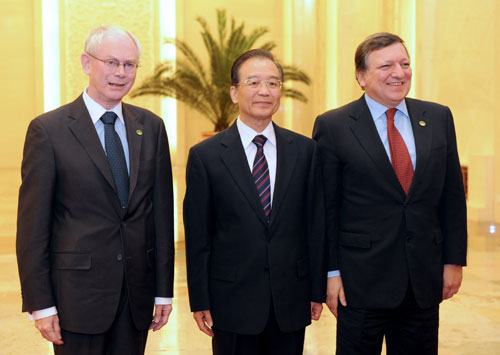China, EU leaders stress cooperation
 0 Comment(s)
0 Comment(s) Print
Print E-mail Xinhua, February 15, 2012
E-mail Xinhua, February 15, 2012
Leaders of China and the European Union (EU) on Tuesday underscored the importance of beefing up economic and trade cooperation in the context of the stagnant world economy.
|
|
|
Chinese Premier Wen Jiabao (C) meets with European Council President Herman Van Rompuy and European Commission President Jose Manuel Barroso at the 14th China-EU leaders' meeting in Beijing on February 14, 2012. [Xinhua photo] |
The call came from the 14th China-EU summit in Beijing, which was attended by Chinese Premier Wen Jiabao, European Council President Herman Van Rompuy and European Commission President Jose Manuel Barroso.
"It is currently the most urgent task for China and the EU to enhance economic and trade cooperation," Wen said at a press conference after the summit, during which he raised a five-point proposal to the EU side in this respect.
He suggested that the two sides should expand mutual investment, promote the balanced and sustainable development of bilateral trade, strengthen cooperation on scientific research and innovation, deepen energy and environmental protection cooperation and advance the partnership in urbanization.
Wen pointed out during the summit that with the global financial crisis still affecting the world in terms of politics, economics and security, it is the current trend for each nation to promote reform and widely participate in international cooperation.
Wen proposed strengthening China-EU cooperation with the following five points.
First, the two sides need to expand the bilateral trade scale. China is willing to import more products from the EU and promote balanced trade. China hopes the EU will relax its export control against China, carefully use trade remedy measures and create a favorable environment for the stable development of bilateral trade.
Second, the two sides should launch negotiations on a two-way investment agreement as soon as possible, so as to "lay a legal foundation for the expansion of bilateral investment" and consolidate the confidence of investors.
China welcomes European enterprises to invest in the Chinese market, Wen said, noting that China will continue to expand market access for EU enterprises, improve laws and regulations on foreign investments, enhance intellectual property rights (IPR) protection, and optimize the investment environment.
He also called on the EU side to maintain market openness and facilitate project examination and approval procedures, personnel exchanges, policy consulting and information exchanges.
Third, the two sides should strengthen cooperation in scientific research and innovation, particularly in areas of space technology and energy technology.
Fourth, China hopes to hold a high-level China-EU energy conference to determine priorities for cooperation.
Wen also said China and EU should launch new projects in environmental protection and the development of electric auto vehicles.
Fifth, on the issue of urbanization, the two sides should cooperate in areas of city planning, smart transportation system, building energy efficiency and garbage disposal.
Describing the relations between the EU and China as "interrelated," Van Rompuy called on the two sides to convert the bilateral strategic partnership into new opportunities.
The EU is China's largest trade partner, while China is close to being the EU's largest trading partner, he said, noting that the bilateral trade volume per day has exceeded 1 billion euros.
Van Rompuy called on the two sides to provide convenience for bilateral trade and investment, in an effort to improve bilateral trade relations.
In order to boost economic development and employment, he suggested that the long-term strategy of EU-China cooperation should focus on innovation, scientific research and technology, energy, networks as well as a new partnership on sustainable urbanization.
With regards to granting full market economy status to China, Van Rompuy said the two sides have listed the issue in the joint statement which will be released after the summit.
The two sides have attached great importance to, and stepped up their efforts in, addressing the issue, and will resolve it in the fastest and most comprehensive way, he said, citing Article 10 of the statement.
Although the issue remains unresolved, the two sides have a strong political will to settle it, he said, noting that the consensus was an important contribution made by the summit.
In the press conference, Barroso voiced the EU's support for China's restructuring of its economic growth pattern, which will focus on boosting domestic demand.
He expressed satisfaction over bilateral trade relations, noting that prosperous trade relations have boosted employment, innovation and economic growth for both sides.
According to statistics, the bilateral trade volume has reached 560 billion euros.
Barroso stressed the importance of creating a fair and open competition environment for both sides' businesses, which will encourage growth and innovation.
In 2012, the EU and China will start a series of negotiations, and the most important among them will be negotiations on a two-way investment agreement, he said.
Regarding EU-China's new partnership on sustainable urbanization, Barroso said the program will push forward the development of the green economy, urban planning, energy security and migration management for both sides.
The EU and China are determined to make joint efforts in coping with a multitude of global challenges, he said, noting that the two sides have reached strategic consensus at the summit on maintaining stable and sustainable economic growth and will jointly work toward this goal.






